Characteristics of Amadeus roses and the rules for their cultivation
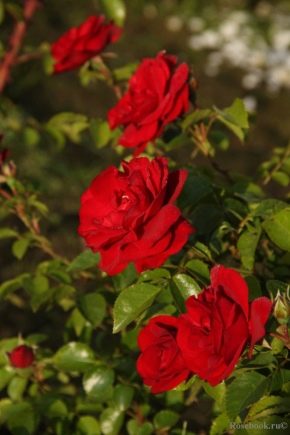
Climbing roses have become part of the life of modern gardeners. Such plants are indispensable in the design of hedges, arches, gazebos, fences and other similar structures. The assortment of such roses is huge, but the Amadeus rose stands out among this variety. It is worth considering in more detail the characteristics of the variety and the characteristics of cultivation.
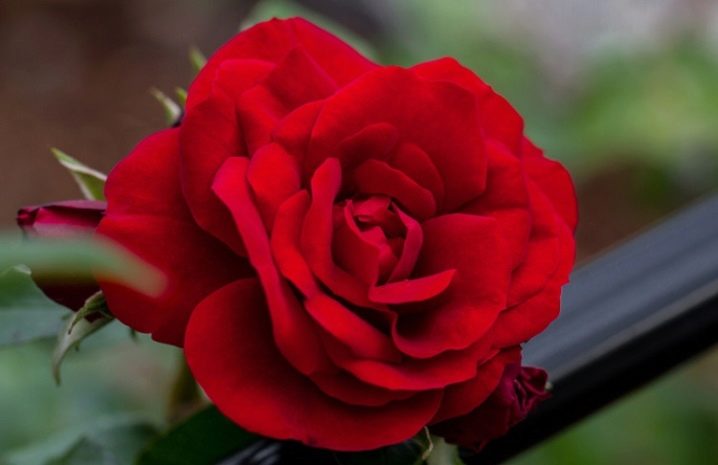
Description
This variety appeared in 2003 thanks to the work of the breeder William Cordes, whose name is widely known worldwide. The fruit of his labors was a climbing rose with unique features and high resistance to diseases, pests and adverse weather conditions. This variety has international certificates and awards. This plant is luxurious, it embodies natural beauty, nobility and luxury. The shape of each flower is characterized by sophistication and elegance. The buds are painted in a rich crimson color, the petals have a velvety surface. The shape of the bud is elongated, classic. Each flower consists of 42 petals, and when blooming, it grows up to 12 cm in diameter.
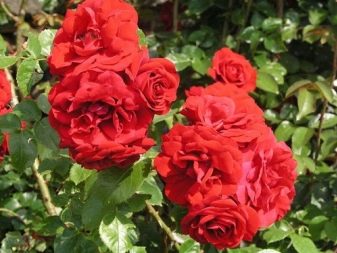
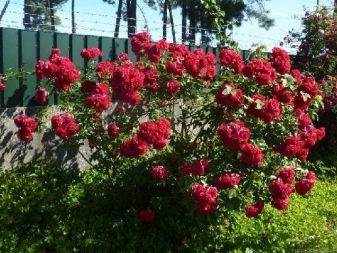
Up to 10 buds can be located on one peduncle, but more often 6 flowers are tied. The brushes are lush and fragrant. Separately, it is worth noting the aroma that comes from the rose when it blooms. The scent is sweet and pleasant with fruity notes of cherries, apricots and raspberries. The Amadeus rose blooms several times a year. The first flowering occurs at the beginning of summer and lasts about 1.5 months. Between the second flowering, the bush produces single flowers. It turns out that "Amadeus" is a decoration of the garden all summer, right up to autumn.
The size of the bush is considered average for climbing roses. Its height reaches 3 meters, and the plant grows 2 meters wide. The shoots of this plant are powerful and thick, do not need support.
But additional support will not be superfluous, since with abundant flowering, branches can tend to the ground.
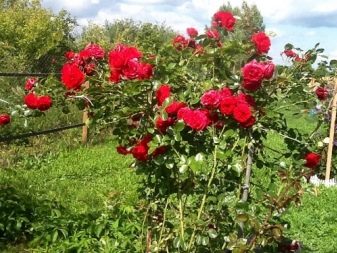
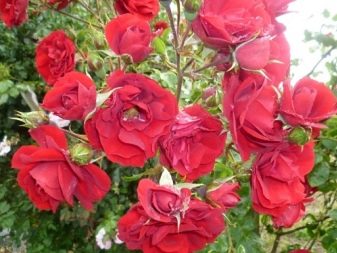
Landing
Description of the rose "Amadeus" would be incomplete without advice on planting this plant. It is not capricious, so it will be enough to adhere to the following simple rules for the bush to start well, to please with abundant flowering and good growth:
- the landing site should be sunny and well-ventilated, but without drafts; with a lack of light, the shoots will grow poorly;
- the soil is loose, with good water permeability; if there is heavy clay in the soil, lime will need to be added;
- a rose is equally well accepted in spring planting and in autumn, so you can choose any time convenient for you;
- groundwater should not adjoin higher than 1.5 meters, otherwise the root system will rot and the plant may disappear;
- for a bush, you need to prepare a pit 50x50 cm, fill it with black soil or natural sandy soil, and also add humus or compost;
- drainage is laid, fertile soil is poured on top;
- then the roots of the rose bush are straightened and covered with a fertile mixture; water abundantly;
- the bush propagates with the help of cuttings and layering, while retaining all its properties and characteristics.

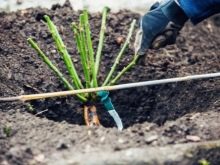
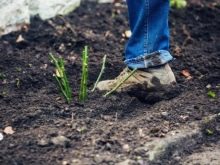
Care
Although the rose "Amadeus" is not capricious and demanding, it still needs care. Nothing complicated will need to be done, so even a novice gardener will find it easy to grow such a beauty on his site.


Care instructions are described below.
- All roses love watering, Amadeus is no exception. Once a week will be enough, in dry weather the frequency of watering increases up to 2 times. For irrigation, it is advisable to use settled warm water.
- Top dressing must be carried out in the spring and autumn in the second year after planting. Humus added to the pit during planting will feed the plant for 2 years. After this period, manure is added in the spring to stimulate the growth of new shoots. In autumn, potassium sulfate, superphosphate, dolomite flour, ash and chalk, lime (slaked) are introduced.
- The bush needs pruning, which starts at an air temperature of -5 degrees. The secateurs must be disinfected and sharp. All shoots that show signs of the disease (spots, mold, rust), as well as weak, broken off branches, inflorescences, leaves, are subject to removal. Healthy branches are pruned 30 cm from the ground.
- For a bush, it is advisable to think over the support in advance. Vertical stands are best, and you will need a lot of them, since the main shoots will release side branches.
- The plant should be transplanted in autumn or early spring after the ground has thawed. The bush must be dug out very carefully so that the root system is not damaged. Bad and small roots are cut with pruning shears. In the new pit, drainage and nutrient mix is being prepared. When transplanting, the plant must be carefully set in a new place and the roots should be spread. After a few days, you need to add soil under the bush, since there may be soil subsidence.
- The rose needs shelter, especially in cold regions with frosty winters. It is necessary to provide high-quality thermal insulation. Shoots can be left on a support, or they can be removed, fixed near the ground, covered with spruce branches and a thick film. Even with light cover, the bush is able to withstand severe frosts at -30 degrees.


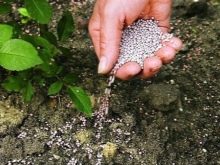
Advantages and disadvantages
Characterization of the Amadeus rose would be incomplete without studying the positive and negative features. It has the following advantages:
- abundant flowering throughout the season with virtually no interruptions;
- preservation of the color of the petals, despite the rain and sun;
- good penumbra tolerance;
- fast rooting and good survival rate allow you to see flowering in the first year after planting;
- a change in the color of a flower during its life cycle - the buds are colored scarlet, at the peak of flowering a crimson hue prevails, which is replaced by purple;
- high resistance to common diseases such as black spot and powdery mildew;
- looks good in compositions and as an independent element.
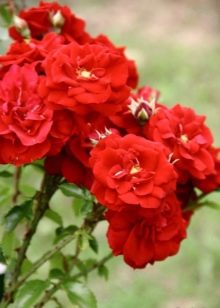
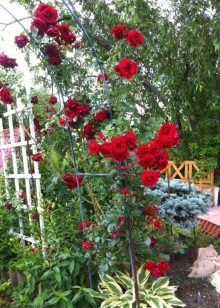

It is worth noting only one drawback inherent in this rose bush. It consists of a large number of sharp and thick thorns. This is the only moment that can upset a gardener.
Why doesn't it bloom?
This problem is rare, but it still occurs. The following factors can be the reason for this behavior of the rose bush:
- lack of lighting;
- insufficient amount of nutrients in the soil;
- disease or pest attack;
- lack of cropping;
- the need for a transplant.
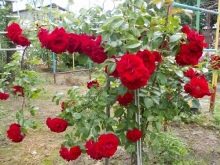
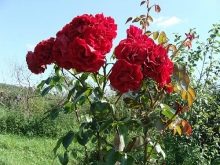
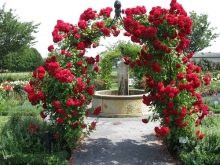
Any of these problems can be easily solved. If you take timely measures, then soon the rose will thank you for the care with abundant flowering.
Reviews
The vast majority of gardeners with different backgrounds are delighted with this plant. In the reviews, there are different variations in the design of the bush: entwining arbors, arched plexus, design of the corners of buildings. And even just in the form of a bush, a rose is a divine decoration of any site. These rose bushes are the pride of the owner and the envy of the neighbors. Therefore, gardeners are often engaged in plant breeding. Of course, there are also less positive reviews.They are often caused by mistakes in the care or planting of the plant, the wrong choice of terrain with a lot of shade and insufficient watering. Do not repeat these mistakes, then there will be no limit to your delight in the beauty of the Amadeus rose.
Rose "Amadeus" looks gorgeous in compositions consisting of several varieties of rose bushes. The Utersen variety is best suited as a pair for such a plant. The differences that are characteristic of these two varieties create a pleasant contrast. This combination gives the garden brightness, makes it unique and cozy. Evergreens can be planted next to pink shrubs, which will decorate the backyard in winter. The beauty of this plant is difficult to resist. In addition, the list of advantages captivates and encourages the purchase of a seedling.

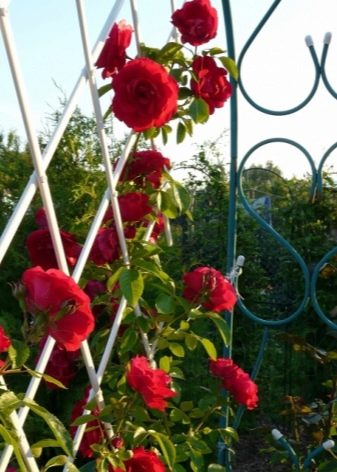
How the Amadeus rose blooms, see the video below.





















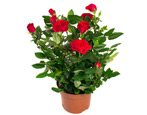






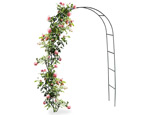
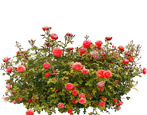



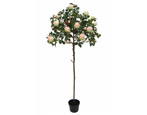































































The comment was sent successfully.